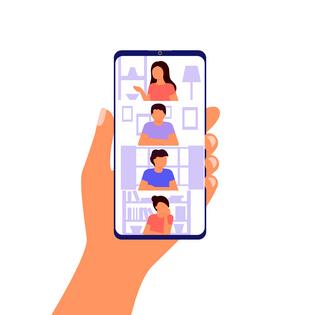How accurate is information from your online health support group?
Published in Health & Fitness
Taking part in an online support group has many benefits, such as convenience, camaraderie, and encouragement. “It’s social support you don’t always get from a busy clinician’s office. Someone in the group might say, ‘I went through this, too. Hang in there, it will get better,’” says Kasisomayajula Viswanath, a health communication researcher and professor at the Harvard T.H. Chan School of Public Health.
You might also pick up helpful tips and advice from other members. Just be careful: some of the information might not be accurate, and some might even be harmful.
What are these groups?
Online health support groups are similar to in-person groups. You can find them for just about any medical problem you can imagine, such as groups for people trying to lose weight, prevent a second heart attack, fight osteoporosis, manage caregiving stress, or cope with a particular medication’s side effects. Participation might or might not be free.
The difference is that online support groups meet in virtual spaces and enable you to participate from home.
How they “meet”
Online health support groups “meet” in different ways.
Some groups use only written communication in forums or discussion boards (such as Reddit or the U.K.-based HealthUnlocked) and social media platforms (such as PatientsLikeMe, Inspire, MyHealthTeam, or Facebook). Members write about their health circumstances, experiences, and challenges; ask health-related questions; give health-related advice; offer supportive comments; share links to health resources; or just peruse the posts. Each group has an administrator (usually a peer but sometimes a health care professional) who oversees posts.
Other health support groups schedule live meetings on videoconferencing platforms, such as Zoom or Doxy.me. Each group has a discussion leader, who’s a peer or a health care professional. Meetings often have a topic and time for chatting.
Questionable information
Hopefully, the information offered in online groups is accurate and helpful. But that’s not always the case, due to the nature of the Internet. For example:
Anyone can start or join an online health support group. They don’t have to be health experts to share information, which might not be science-based and could be wrong, ineffective, or even harmful.
You don’t know these people. Members (there could be dozens, hundreds, or thousands in a group) often use aliases or remain anonymous. “The person giving advice could be someone genuinely affected by a health condition who just wants to help, or it could be someone who’s marketing a product or treatment to make money. There’s no way to know,” Viswanath says.
Comments are often biased. Discussion-board groups frequently attract people who complain about certain medications and treatments. This could be because people feel freer to express themselves anonymously online, or because a bad actor is trying to steer you toward a product. The result: you might see a disproportionate amount of negative information about something your doctor feels you need.
Tips to stay safe
Certain strategies can help you filter out or avoid potentially harmful information from online health support groups. Viswanath recommends the following.
Join a sponsored group. Those affiliated with doctor’s offices, hospitals, or nonprofit health organizations typically have knowledgeable health care professionals overseeing the conversations.
Verify information. Talk to your doctor, pharmacist, or even a nurse hotline about information from the group that seems important. Or compare it with material online that’s generated, vetted, and continuously updated by credible sources, such as Harvard Health Publishing or a large national nonprofit health organization such as the American Heart Association.
Be wary of medication advice. Taking a new drug or supplement on the advice of a support group could be harmful. “It may not be tailored to your physiology and health history. It might interfere with your existing medications or mask an underlying condition. Check with your doctor first,” Viswanath says.
Keep your guard up. Viswanath says you don’t have to be cynical and assume everyone in the group has hidden agendas. “But you want to have a certain degree of skepticism in accepting health information from people who aren’t on your health care team,” he notes. Also: consider how much you want to share about yourself.
(Heidi Godman is executive editor of Harvard Health Letter.)
©2025 Harvard University. For terms of use, please see https://www.health.harvard.edu/terms-of-use. Distributed by Tribune Content Agency, LLC.










Comments